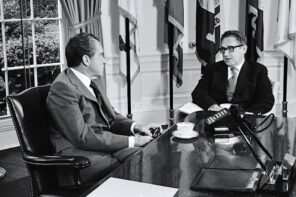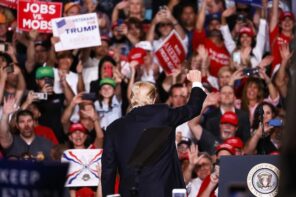As we passed by the “Little India” shopping center, the driver of the car next to us began excitedly waving to one of our hosts. It turns out that they knew each other, though the man’s cheerfulness belied his true purpose. He’d been living in America for years now, like tens of thousands of other exiled Bosniaks, and had returned solely for the commemorations at Srebrenica. His father’s body had finally been found; or at least all of it, except for a hand.
Many Bosnians might feel the same about their country, impossible to fully recover. What peace there is seems designed not to stop the war so much as postpone it till later, at which point, perhaps the hope was, some new means to defuse it would have been devised. The international community determined Bosnia’s post-war boundaries, dividing the country into a Muslim-Croat Federation and the Republika Srpska (RS), based on where each side stood when the fighting stopped.
From the Bosniak perspective, this means Serb forces were rewarded for their ethnic cleansing, receiving 49% of the country although they’re approximately a third of the population. These boundaries remain a source of deep frustration, though I never heard any desire for violent redress—shocking, considering the kind of overheated rhetoric that passes for political discourse in America. Rather, Bosnians, and especially Bosniaks, expressed concern that the peace accords only forced the war into new fronts.
The conflict was ended by NATO’s power, and it is on NATO that Bosniaks must put their trust. But does NATO really want to help Bosnia, they ask? Some Bosniaks insist NATO’s intervention came only to prevent a larger religious conflict, especially the kind that might have ensued had they continued to turn the momentum against the Serbs. And unlike their Croat allies and former Serb enemies, the Bosniaks have no neighboring homeland to appeal to for assistance, or look to for refuge. Their security lies in a kind of charity.
The instruments of economic and political power are largely out of their hands. Within the Muslim-Croat federation, each party balances the other; at the federal level, each division can veto the other. For all its energy, its young folk in their fashionable clothes, and even its new investments, Saudi-funded luxury apartments or hotels and the occasional shiny shopping malls, the Bosniaks have a country that doesn’t work, a country in which they can’t pursue the development they believe is required to make themselves secure.
For who now would want to invest in Sarajevo? Aid from European countries, though it is their largest source of funding, seems an uncertain blessing. Were these not the same countries that stood neutral during much of the war? Bosnian ties with Turkey bring some cultural confidence, schools and infrastructure; Islamic investment banks pour money into the country so far as they can. Larger Muslim countries have built mosques and repaired infrastructure. It’s natural to expect Muslim-majority countries to volunteer in such risky circumstances, except that for Serbs and sometimes Croats, this interest is suspect—and the paranoia runs in both directions.
The question becomes one of moving forward, especially difficult considering how recent, how obvious, and how severe the war was.
One can drive through Bosnia’s divisions without obvious hassle. We came down the side of a mountain, passed an outsize welcome billboard on which, for the first time, the Cyrillic and Latin scripts were flipped, and so knew we were in the RS. It’s the same country. Except it is not. The contrast between the two regions is unexpected—although I only passed through Serb areas around Sarajevo, economically unimportant to the shared national capital (shared politically, that is; demographically, the city is overwhelmingly Bosniak). But all the same, my first impression was that the worst atrocities had happened to Serbs.
After passing bold Serbian flags—at whose first sight the mood in our car would dim—we entered rundown neighborhoods. Post-Soviet in the worst ways. The Bosniaks had an intriguing explanation for these contrasts. Bosniaks insisted that the deaths of the innocent bring after them a tangible mercy, a kind of divine grace settled on those who suffered. This brings a kind of blessing and solace, whose absence is as noticeable as is its presence. It was certainly not what I expected to hear. But how else do people make sense of what they’ve gone through, and of their religion, when it was on those grounds that they were attacked?
A tiny city, Sarajevo has endless cemeteries squeezed into every available space, one of them inside a stadiums for when no space could be found for the bodies, bringing to mind a ghoulishly overstuffed apartment. The city endured, but not infrequently reveals its hideous gashes and mutilations, buildings burned and mosques trashed, houses gutted and streets pockmarked. Folks I talked to pointed to the places where they lost loved ones, sometimes multiple family members on the same days. We stopped at a café and met a man in a bright pink polo shirt who looked too young and too cheerful to have fought in the war sixteen years ago.
It was hard enough to digest—the sudden references to the deaths of close family members, the proximity of their places of murder. What would I have found in Srebrenica?
But my flight arrived too late. Although we had access, we would’ve arrived well after the commemorations, and may have missed the chance to meet the people who needed to be talked to—by then many would’ve been on the return trip to Sarajevo. More than that, in the face of the thousands making the return trip before nightfall, we may have been forced to spend the night. Bosnia has no real highways, infrastructure another victim of its troubled politics.
A Serbian protest was planned for the next day, in part over the arrest and extradition of Ratko Mladic. My hosts insisted it wouldn’t be safe to stay the night, in a city whose murdered are now memories, where many of the police were once at the core of the Serb forces during the war. That is, after all, how peace treaties are signed, countries are stitched together again, and armies reintegrated. The people who are supposed to protect you are the same ones who years earlier ethnically cleansed you.
You just have to believe it will work.




